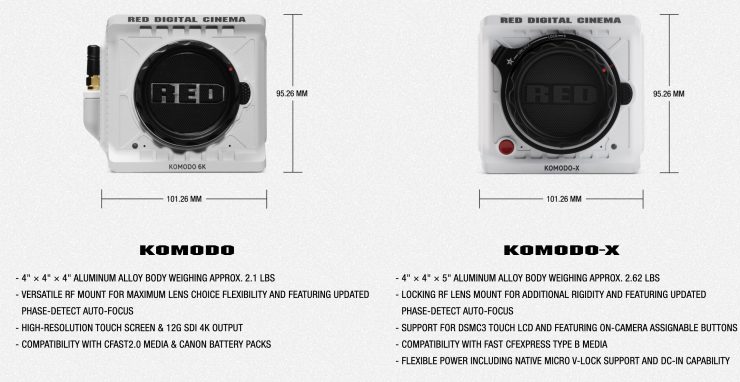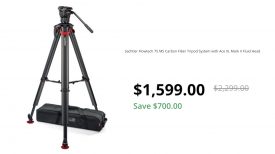
While RED is still shipping out the limited edition Stormtrooper KOMODO-X cameras, they have announced that the standard black version of the camera will be available to pre-order from the 31st of May.
Even though pre-orders start on the 31st, the black versions of the KOMODO-X won’t start being built till mid-June.
As far as we are aware, the standard black version will also cost $9,995 USD.
If you are not familiar with the new KOMODO-X digital cinema camera, it was designed to bridge the gap between the standard KOMODO and RAPTOR cameras.

While the KOMODO-X isn’t a massive departure away from the original KOMODO, it does feature some new capabilities and recording options.

Above you can see some of the key physical differences between the KOMODO and KOMODO-X.
Key features
- 19.9MP Super35 Global Shutter CMOS
- Compact DSMC3 Design
- Locking Canon RF Lens Mount
- Up to 6K80p & 4K120p Video
- 12G-SDI, USB-C, 5-Pin Audio Ports
- 6K Streaming via RED Connect License
- Wireless Control, File Offload via Wi-Fi
- Integrated 2.9″ Touchscreen

The retail price for the KOMODO-X (body only) is $9,995 USD. That makes it $4,000 USD more than the standard KOMODO.
For that $9,995 USD you get the following items:
- KOMODO-X Camera Body
- DSMC AC Power Adaptor Pack (150W)
- RED Logo Sticker
- KOMODO-X Information Card (incl. registration and support info)
- 2 Year Standard Warranty
The camera sits in an already crowded sub $10K space. There are a lot of competing cameras that sit between $4,000 to $11,000 USD. Let’s have a look at how the price of the KOMODO-X compares to other competing cameras that are $10K or less:
| PRICE | |
| RED KOMODO-X | $9,995 USD |
| RED KOMODO | $5,995 USD |
| Canon C500 Mark II | $10,999 USD |
| Canon C300 Mark III | $8,999 USD |
| Canon C70 | $5,499 USD |
| Blackmagic URSA Mini Pro 12K with OLPF | $6,385 USD |
| Blackmagic Design Pocket Cinema Camera 6K Pro | $2,535 USD |
| Sony PXW-FX9 | $10,999 USD |
| Sony FX6 | $5,998 USD |
| Kinefinity MAVO mark2 6K | $4,198 USD |
| Kinefinity MAVO Edge 6K | $9,999 USD |
| Kinefinity MAVO mark2 6K LF | $8,498 USD |
| Z CAM E2-F6 | $2,999 USD |
| Z CAM E2-F8 | $5,995 USD |
| Z CAM E2-S6G S35 6K | $5,995 USD |
So how much would the real cost of entry be to own a KOMODO-X? Well, that depends on a lot of variables, but here is an indication based on several accessories that are available for the camera:
- RED KOMODO-X $9,995 USD
- RED KOMODO RF TO PL w/ND FILTR/ADAP PK $3,500 USD
- NANO-V 49Wh batteries x 4 $1,100 USD
- Angelbird 1TB AV Pro MK2 CFexpress 2.0 Type B Memory Card x 4* $1,399.96 USD
- RED DIGITAL CINEMA DSMC3 RED Touch 7.0″ LCD Monitor $2,750 USD
*I am not sure whether these cards will be approved for use by RED
If you just add those items above the total would be $18,744.96 USD
Sure you could go without the RED KOMODO RF TO PL w/ND FILTR/ADAP PK and you could find cheaper batteries, and choose a SmallHD Indie 7 RED RCP2 Monitor Kit for KOMODO/DSMC3 over a RED DIGITAL CINEMA DSMC3 RED Touch 7.0″ LCD Monitor to keep costs down, but my point is, that the cost of whatever camera you buy, is never the real cost. If you are thinking about buying a camera (regardless of who makes it), you need to factor in the associated costs of what is required to make it an operational and functional camera for your personal requirements.
If you look at the majority of the competition in the under $11K space, those cameras come with built-in ND and LCD screens. Sure, the KOMODO-X has a built-in 2.9″ touchscreen LCD on the top of the camera, but that isn’t going to be a viable option for monitoring or composing images.
Sensor

The KOMODO-X utilizes the exact same 19.9MP (27.03 x 14.26 mm) Super35 Global Shutter CMOS sensor that is found in the original KOMODO. According to RED, it features a completely overhauled sensor architecture, with an updated pixel design which is claimed to lead to improvements in both detail and color in the shadows.
RED claims 16.5+ STOPS of dynamic range, but take that figure with a grain of salt. People have independently tested the KOMODO and it doesn’t have anywhere near 16+ stops of dynamic range. I really wish companies wouldn’t exaggerate dynamic range numbers.
Color management is done through IPP2 image processing pipeline and the camera supports 33×33×33 3D LUTS and the import of CDLS.
Recording Options & Frame Rates

The KOMODO-X is capabale of recording in 6K 17:9 / R3D ELQ at 80fps, and 4K at up to 120fps. As a comparison, the original KOMODO was only capable of recording up to 40fps 6K 17:9 (6144 X 3240) in REDCODE HQ, MQ and L. In 4K 17:9 it can record up to 60fps.
REDCODE RAW MAX FRAME RATES
- 80 fps at 6K 17:9 (6144 x 3240)
- 96 fps at 5K 17:9 (5120 x 2700))
- 120 fps at 4K 17:9 (4096 x 2160)
- 240 fps at 2K 17:9 (2048 x 1080)
BEST AVAILABLE REDCODE SETTINGS
- REDCODE HQ, MQ, LQ, and ELQ at 6K 17:9 (6144 x 3240) up to 80 fps
- REDCODE HQ, MQ, LQ, and ELQ at 4K 17:9 (4096 x 2160) up to 120 fps
- REDCODE HQ, MQ, LQ, and ELQ at 2K 17:9 (2048 x 1080) up to 240 fps
REDCODE RAW ACQUISITION FORMATS
- 6K 17:9 (6144 x 3240), 2:1, 2.4:1, 16:9. 1:1, and Anamorphic 2x, 1.8x, 1.6x, 1.5x, 1.3x, 1.25x
- 5K 17:9 (5120 x 2700) and 16:9
- 4K 17:9 (4096 x 2160) and 16:9
- 2K 17:9 (2048 x 1080)
6K 17:9 at 80fps is pretty good. As a comparison, the more affordable Kinefinity MAVO S35 MKII can do 6K 17:9 at up to 75fps.

The main reason the KOMODO-X can record higher frame rates than the original KOMODO is that it utilizes CFexpress Type B media instead of CFast 2.0 like the original KOMODO. CFexpress Type B is the same media that is used in the V-RAPTOR cameras, so if you owned one of those and wanted to pick up a KOMODO-X as a B camera you could use the same media.
REDCODE RAW ACQUISITION FORMATS
- 6K 17:9 (6144 X 3240), 2:1, 2.4:1, 16:9 AND ANAMORPHIC 2X, 1.8X, 1.6X, 1.5X, 1.3X, 1.25X
- 5K 17:9 (5120 X 2700)
- 4K 17:9 (4096 X 2160) AND 16:9
- 2K 17:9 (2048 X 1080)
APPLE PRORES
ProRes recording in 4K (4096 x 2160) ProRes 4444 XQ up to 60 fps, ProRes 4444 up to 80 fps, and ProRes 422 HQ, ProRes 422, and ProRes 422 LT up to 120 fps is possible.
Size & Weight

The KOMODO-X weighs 2.62 lbs / 1.18 kg (without body cap and CFexpress card). It has physical dimensions of 129.37 x 101.26 x 95.26 mm / 5.1 x 4 x 3.8 in (LxWxH, largest fixed dims.)

Above you can see how it compares size-wise with the original KOMODO.

Above you can see how the KOMODO-X compares in size to both the standard KOMODO and the V-RAPTOR.

Above you can see more details of how it differs from the original KOMODO.
Power

Unlike the original KOMODO which had two slots for BP-9 series batteries, the KOMODO-X utilizes a micro V-Lock allows for direct attachment of professional micro V-Lock batteries without the need for adapters and is also compatible with the upcoming RED Pro I/O Module to provide auxiliary power and compatibility with full-sized V-Lock and Gold Mount batteries.

You can use the new RED NANO-V 49Wh batteries, or you could use other Mini-V-lock batteries such as the Core SWX NANO Micro 98Wh.
An integrated micro V-Lock allows for direct attachment of professional micro V-Lock batteries without the need for adapters and is also compatible with the upcoming RED Pro I/O Module to provide auxiliary power and compatibility with full sized V-Lock and Gold Mount batteries.
There is also an 11 to 17V DC power available via the integrated 6-pin DC-IN port.
REDVOLT NANO-V

The REDVOLT NANO-V battery ($275 USD) is a small, lightweight power solution for the KOMODO-X. It weighs 0.63 lbs / 288g and is ideal for gimbals, drones, and other setups where form factor and weight matter. The battery’s dimensions (66 mm x 88 mm x 44 mm) ensure the camera retains completely flat surfaces on the top and sides, allowing users to attach various combinations of cages and plates, without issue.
Featuring a 49 Wh capacity and with a maximum output current of 6 amps, the battery can power the KOMODO-X and DSMC3 RED Touch 7.0” LCD when you want to shoot in as light a configuration as possible.
REDVOLT NANO-V was designed in partnership with Core SWX and is compatible with most cameras/modules that accept V-Lock batteries. For issues or troubleshooting, please visit https://coreswx.supportsystem.com.
Please note that the battery is not currently not shipping to Brazil, China, India, Japan, Mexico, Saudi Arabia, Singapore, South Africa, Thailand and UAE
Mount

The KOMODO-X features a locking Canon RF mount which is not the same as the one found on the original KOMODO. The mount will accept Canon RF lenses and adapters, and it will also support Canon EF lenses with full electronic communication via compatible Canon RF mount adapters.
RED tested the following lenses and confirmed the functionality for use with KOMODO and KOMODO-X:
- Canon RF 15-35 mm f/2.8 L IS USM1
- Canon RF 24-70 mm f/2.8 L IS USM2
- Canon RF 24-105 mm f/4 L IS USM3
- Canon RF 24-240 mm f/4-6.3 IS USM4
- Canon RF 28-70 mm f/2 L USM
- Canon RF 35 mm f/1.8 Macro IS STM
- Canon RF 50 mm f/1.2 L USM
- Canon RF 70-200 mm f/2.8 L IS USM
- Canon RF 85 mm f/1.2 L USM DS
- Canon RF 100-500 mm f/4.5 – 7.1 L IS USM5
- Canon RF 800 mm f/11 IS STM6
- Canon EF 14 mm f/2.8L II USM
- Canon EF 24 mm f/1.4L II USM
- Canon EF 35 mm f/1.4L II USM
- Canon EF 50 mm f/1.2L USM
- Canon EF 85 mm f/1.2L II USM
- Canon EF-S 17-55 f/2.8 IS USM
- Canon EF 24-70 f/2.8L II USM
- Canon EF 16-35 f/2.8L III USM
- Canon EF 24-105 f/4L IS II USM
- Canon EF 70-200 mm f/2.8L IS III USM
NOTE: Select RF lenses may not display their maximum or minimum aperture value in-camera, however, they are physically achieving the full aperture range. Below are those lenses where this applies:
- f/2.8 displays as f/2.9
- f/2.8 displays as f/2.9
- f/4.0 displays as f/4.2
- f/4.0 displays as f/4.1
- f/4.5 displays as f/4.6
KOMODO RF TO PL w/ND FILTR/ADAP PK

You can also use RED’s new optional KOMODO RF TO PL w/ND FILTR/ADAP PK. This allows you to run PL mount lenses on the KOMODO-X with the added benefit of being able to use ND or other filters.

The RED KOMODO RF to PL w/ Electronic ND Filter Adapter Pack integrates the same precise electronic ND control as used in the V-RAPTOR XL.
The pack includes two filters, a clear filter for when no ND is needed and an Electronic ND Filter with a 2-7 stop range. It features precise control of ¼, 1/3 or full stop increments which allows choosing the exact exposure without compromising the intended aperture.
Each clear and electronic ND filters thickness is measured and paired together to ensure no back focus shifts when switching between filters. ND can be controlled via the integrated buttons on the Electronic ND Filter, onboard LCD, DSMC3 RED Touch 7.0” LCD, RED Control, RED Control Pro, web interface, or any other RCP2 compatible remote control, allowing for easy access to exposure no matter how the camera is configured.
The adapter supports Cooke /i lens communication and record triggering, the RF to PL Adapter w/ Electronic ND expands the functionality of the camera’s native RF lens mount for professional applications. Constructed of a titanium core, the shimmable RF to PL Adapter is resistant to environmental temperature changes, providing consistent and precise back focus.
The RED KOMODO RF to PL Adapter w/ Electronic ND Filter Adapter Pack includes both the KOMODO Side Ribs and Adapter Support Brackets to provide additional rigidity and a native-like mount experience.
Users who already own the RED KOMODO RF to PL Adapter Pack and have the KOMODO Side Ribs and Adapter Support Brackets should contact RED sales directly to purchase the RF to PL Adapter W/ Electronic ND only.
This new adapter is only compatible with KOMODO and KOMODO-X
If you don’t want to go with RED’s option you could also use the Kippertie Revolva RF/PL.

This is a variation of their original Revolva which houses a quick-change cartridge system holding four NDs that can be quickly changed by rotating the cartridge.
Even though was designed for the original KOMODO, it will work on any camera with an EOS RF mount.

The cartridges use Full Spectrum neutral density filters for minimal color shifts.

The Revolva RF/PL reatils for £900 without any cartridges. There is also a Revolva RF/EF if you want to run Canon EF lenses.

There are four different cartridges available which retail for between £400-£450.00 each dependng on which one you choose. While Revolva is a devent enough solution, the amount of ND you can use without having to change a catridge is pretty limited.
If you already have a Revolva for your DSMC2 camera, you can use the same cartridges.
Monitoring

The KOMODO-X only has the same 2.9″ 1440×1440 touchscreen LCD as the original KOMODO. While this allows you to make changes to camera settings, and see a live image, it realistically isn’t a viable viewing solution.

RED has made the KOMODO-X comaptible with the DSMC3 RED Touch 7″ LCD Monitor. This a 7.0″ Daylight-Viewable 1920×1080 LCD, with 1300nits of brightness and a ppi of 322. The monitor attaches directly to the camera using the Pogo mount, and it provides video, data, and power to the monitor from the camera. If you need to use the Pogo mount for another accessory, the monitor also features a locking USB Type-C connector that alternately allows you to pass video, data, and power to the camera. The monitor features a tilt mount that allows it to tilt 180°.
It is good that RED has made this compatible with the KOMODO-X because it is not compatible with DSMC, DSMC2, RED RANGER, or KOMODO camera systems.

If you don’t want to spend $2,750 USD on RED’s solution you could choose the SmallHD Indie 5 RED RCP2 Monitor Kit for KOMODO/DSMC3 or the larger SmallHD Indie 7 RED RCP2 Monitor Kit for KOMODO/DSMC3.
Inputs & Outputs

The KOMODO-X only features a single 12G -SDI output like its little brother. There is also a USB-C port, as well as a 5-pin LEMO input for running external audio.

The phantom-powered locking audio connector enables KOMODO-X to seamlessly integrate into any professional workflow. KOMODO-X is compatible with DSMC3 RED 5-Pin to Single 3.5mm Adapter to support existing KOMODO microphones, or the DSMC3 RED 5-Pin to Dual XLR Adapter for general-purpose XLR microphones.
The 12G-SDI can output the following:
- 12G-SDI: Up to 4096 X 2160 4:2:2 60P
- 6G-SDI: Up to 4096 X 2160 4:2:2 30P
- 3G-SDI: Up to 2048 X 1080 4:2:2 60P
- 1.5G-SDI: Up to 2048 X 1080 4:2:2 FOR 30P, 24P
- SMPTE Timecode, HANC METADATA, 24-BIT 48 KHZ audio
There is WiFi camera control available through the interchangable antenna using the SMA connection. Genlock, timecode IN , GPIO and CTRL (RS232) are availavle via the 9-pin EXT port.
Wired control is available by using the KOMODO Link Adapter through USB-C or Gigabit Ethernet (a compatible USB-C to Ethernet adapter is required to do this) that allows camera control and a live video preview feed to be seen.
RED has teased an upcoming module for the KOMODO-X (it could possibly work on the original KOMODO as well) that will probably offer more IO capabilities, and maybe mini or full sized XLR inputs.

There is a KOMODO Expander Module that was designed to support professional shooting configurations, but I am not sure if it is comaptible with the KOMODO-X. It has options for video, power, and communication connections, including Genlock (BNC), GPI (BNC), Timecode in (BNC), and CTRL (4-pin).
It is constructed from lightweight and durable aluminum alloy, the module provides a reliable option for multiple rigging solutions with multiple ¼-20 and 3/8-16 mounting points and ARRI-style locating holes along with an integrated quick-release plate. It retails for $595 USD.
New Accessories

The RED Compact Top Handle ($539 USD) easily mounts to the top of the KOMODO-X or V-RAPTOR camera bodies while offering a combination of comfort and utility for carrying or shooting with your camera. This top-mounted machined handle features ergonomic Bocote wood inlays with camera trigger control.
The handle includes a handle trigger, rear 3” piece, front 1” piece, and 15mm Monitor Mount.
COMPATIBILITY: The RED Compact Top Handle is not compatible with DSMC, DSMC2 or RED RANGER® camera systems.





















